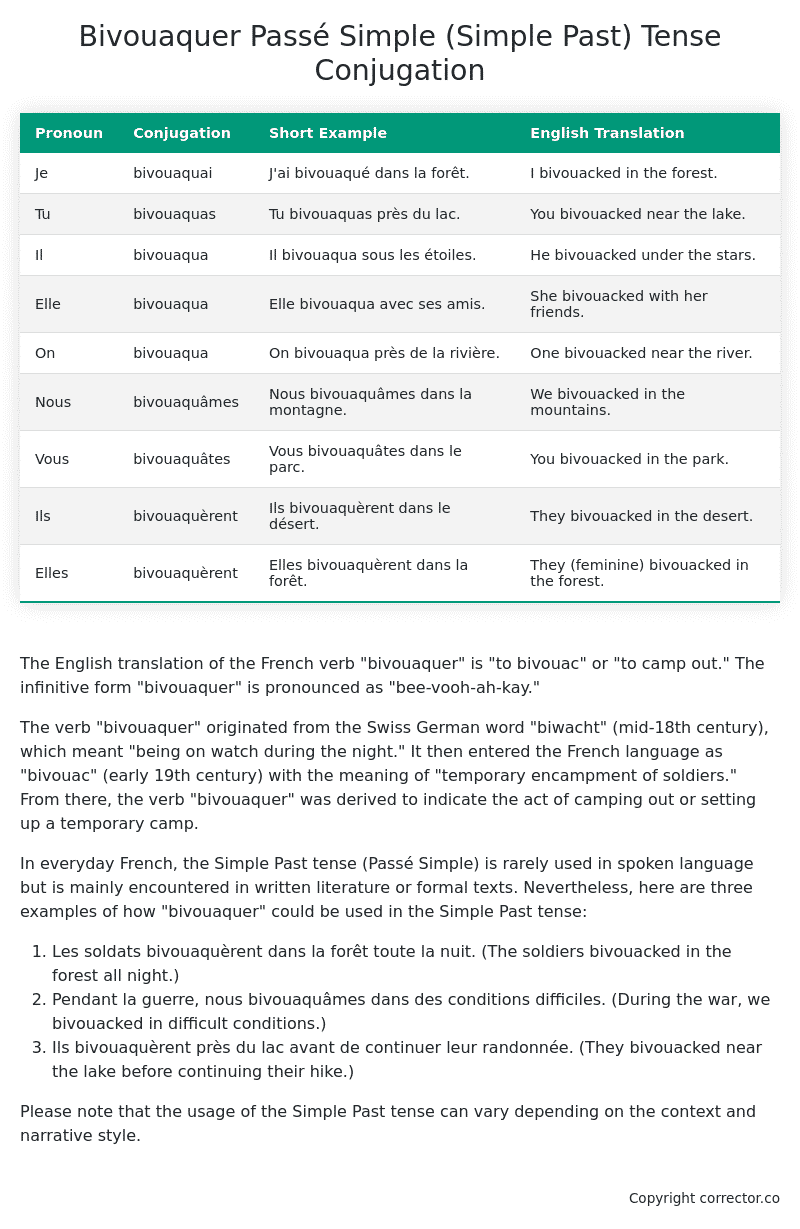Passé Simple (Simple Past) Tense Conjugation of the French Verb bivouaquer
Introduction to the verb bivouaquer
The English translation of the French verb “bivouaquer” is “to bivouac” or “to camp out.” The infinitive form “bivouaquer” is pronounced as “bee-vooh-ah-kay.”
The verb “bivouaquer” originated from the Swiss German word “biwacht” (mid-18th century), which meant “being on watch during the night.” It then entered the French language as “bivouac” (early 19th century) with the meaning of “temporary encampment of soldiers.” From there, the verb “bivouaquer” was derived to indicate the act of camping out or setting up a temporary camp.
In everyday French, the Simple Past tense (Passé Simple) is rarely used in spoken language but is mainly encountered in written literature or formal texts. Nevertheless, here are three examples of how “bivouaquer” could be used in the Simple Past tense:
- Les soldats bivouaquèrent dans la forêt toute la nuit. (The soldiers bivouacked in the forest all night.)
- Pendant la guerre, nous bivouaquâmes dans des conditions difficiles. (During the war, we bivouacked in difficult conditions.)
- Ils bivouaquèrent près du lac avant de continuer leur randonnée. (They bivouacked near the lake before continuing their hike.)
Please note that the usage of the Simple Past tense can vary depending on the context and narrative style.
Table of the Passé Simple (Simple Past) Tense Conjugation of bivouaquer
| Pronoun | Conjugation | Short Example | English Translation |
|---|---|---|---|
| Je | bivouaquai | J’ai bivouaqué dans la forêt. | I bivouacked in the forest. |
| Tu | bivouaquas | Tu bivouaquas près du lac. | You bivouacked near the lake. |
| Il | bivouaqua | Il bivouaqua sous les étoiles. | He bivouacked under the stars. |
| Elle | bivouaqua | Elle bivouaqua avec ses amis. | She bivouacked with her friends. |
| On | bivouaqua | On bivouaqua près de la rivière. | One bivouacked near the river. |
| Nous | bivouaquâmes | Nous bivouaquâmes dans la montagne. | We bivouacked in the mountains. |
| Vous | bivouaquâtes | Vous bivouaquâtes dans le parc. | You bivouacked in the park. |
| Ils | bivouaquèrent | Ils bivouaquèrent dans le désert. | They bivouacked in the desert. |
| Elles | bivouaquèrent | Elles bivouaquèrent dans la forêt. | They (feminine) bivouacked in the forest. |
Other Conjugations for Bivouaquer.
Le Present (Present Tense) Conjugation of the French Verb bivouaquer
Imparfait (Imperfect) Tense Conjugation of the French Verb bivouaquer
Passé Simple (Simple Past) Tense Conjugation of the French Verb bivouaquer (You’re reading it right now!)
Passé Composé (Present Perfect) Tense Conjugation of the French Verb bivouaquer
Futur Simple (Simple Future) Tense Conjugation of the French Verb bivouaquer
Futur Proche (Near Future) Tense Conjugation of the French Verb bivouaquer
Plus-que-parfait (Pluperfect) Tense Conjugation of the French Verb bivouaquer
Passé Antérieur (Past Anterior) Tense Conjugation of the French Verb bivouaquer
Futur Antérieur (Future Anterior) Tense Conjugation of the French Verb bivouaquer
Subjonctif Présent (Subjunctive Present) Tense Conjugation of the French Verb bivouaquer
Subjonctif Passé (Subjunctive Past) Tense Conjugation of the French Verb bivouaquer
Subjonctif Imparfait (Subjunctive Imperfect) Tense Conjugation of the French Verb bivouaquer
Subjonctif Plus-que-parfait (Subjunctive Pluperfect) Tense Conjugation of the French Verb bivouaquer
Conditionnel Présent (Conditional Present) Tense Conjugation of the French Verb bivouaquer
Conditionnel Passé (Conditional Past) Tense Conjugation of the French Verb bivouaquer
Conditionnel Passé II (Conditional Past II) Tense Conjugation of the French Verb bivouaquer
L’impératif Présent (Imperative Present) Tense Conjugation of the French Verb bivouaquer
L’impératif Passé (Imperative Past) Tense Conjugation of the French Verb bivouaquer
L’infinitif Présent (Infinitive Present) Tense Conjugation of the French Verb bivouaquer
L’infinitif Passé (Infinitive Past) Tense Conjugation of the French Verb bivouaquer
Le Participe Présent (Present Participle) Tense Conjugation of the French Verb bivouaquer
Le Participe Passé (Past Participle) Tense Conjugation of the French Verb bivouaquer
Struggling with French verbs or the language in general? Why not use our free French Grammar Checker – no registration required!
Get a FREE Download Study Sheet of this Conjugation 🔥
Simply right click the image below, click “save image” and get your free reference for the bivouaquer Passé Simple tense conjugation!

Bivouaquer – About the French Passé Simple (Simple Past) Tense
Formation
Usage
Narration
Historical Context
Interactions with other tenses
Passé Composé
Imparfait
Conditional and Subjunctive
Summary
I hope you enjoyed this article on the verb bivouaquer. Still in a learning mood? Check out another TOTALLY random French verb conjugation!


